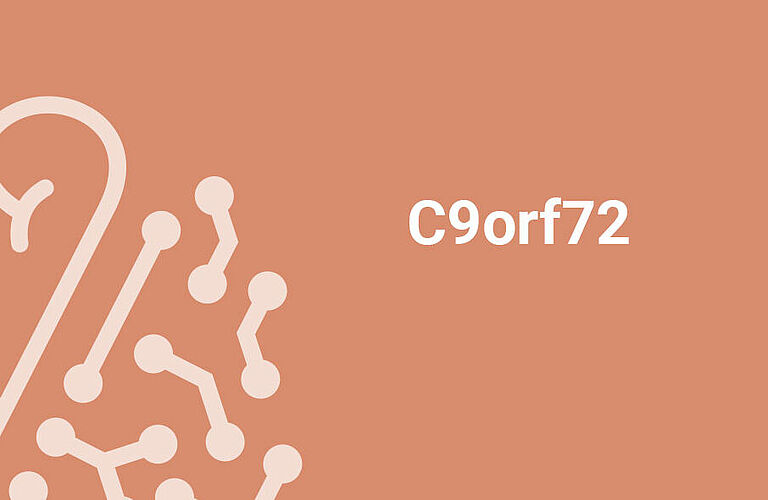C9orf72: A gene mutation with dangerous consequences
Chromosome 9 had been in the sights of researchers for a long time: something must be wrong with it in patients with amyotrophic lateral sclerosis (ALS), they had suspected for years; there must be a mutation at this exact location. Around the turn of 2011 and 2012, scientists discovered the C9orf72 gene. It is mutated in around eight percent of ALS patients in Germany - and this mutation has since then been considered a promising starting point for innovative therapies. Particularly interesting: it is the first mutation to be decoded that triggers both ALS and frontotemporal dementia (FTD). This fits in with the long-held view that ALS and FTD belong to a spectrum of diseases with partly overlapping symptoms.
The name “C9orf72” (chromosome 9 open reading frame 72) sounds complicated, but is actually just the genetic address of the gene. “C9” stands for chromosome 9, ‘orf’ refers in technical jargon to a section of the genome that is responsible for the formation of a protein, and ‘72’ indicates the position.
Thousands of copies as a problem
C9orf72 plays an important role in the removal and degradation of cellular waste in so-called vesicles. These are tiny bubbles with a membrane envelope, comparable to tiny soap bubbles, which break down defective cell components and also certain messenger substances. The C9orf72 gene contains the building instructions for a protein that controls this process. In ALS and FTD patients with a C9orf72 mutation, less of this protein is produced, so that the process is disrupted.
The specific type of mutation is known as a repeat expansion mutation. Normally, a short section (“GGGGCC”) in the code of the C9orf72 gene is repeated two to twenty times. In people with the disease, however, it is repeated thousands of times. You can imagine it like stuttering: The same sequence is repeated very often. It is precisely these repetitions that are looked for in the laboratory with a genetic test if there is a suspicion of hereditary ALS or FTD.
Causes of the mutation
There are three hypotheses in research about what these repeats cause in the body.
Hypothesis number one: If fewer C9orf72 proteins are produced as a result of the mutation, cellular waste disposal is disrupted. This allows misfolded proteins to be deposited and activates inflammatory processes.
Hypothesis number two: During the regular reading of genetic information, a molecular copy in the form of so-called RNA is generated from the repetitive and therefore faulty DNA. This RNA, which is also repetitive, is harmful because proteins mistakenly bind to it, which can then no longer perform their actual function. In other words, these proteins are tied up to a certain extent and can therefore no longer perform their task.
Hypothesis number three: The repetitive RNA can be mistakenly translated into repetitive proteins (which were discovered at the DZNE: Mori et al, Science 2013) and damage the nerve cells.
It is likely that a combination of these three mechanisms triggers the disease.
Where a therapy could start
Scientists are working on drugs to prevent the formation of harmful repetitive RNA and repetitive proteins. One of these drugs, a so-called antisense oligonucleotid, has already been tested in clinical trials, albeit without success.
At the same time, experts are exploring other possibilities, such as gene editing. This involves cutting out the mutation with gene scissors and correcting it. A type of vaccination could also help to combat the disease in the future. The DZNE is a world leader in pursuing such an approach against the repeat proteins (GA-VAX). The repeat proteins only occur in people who have a corresponding mutation and in whom the proteins therefore do not perform a normal function in the cell. Researchers therefore assume that such a therapeutic approach is possible without side effects. This decisive difference to other therapeutic approaches could even open the door to preventive vaccination in known mutation carriers.

